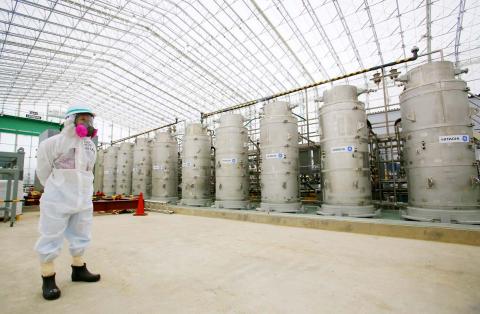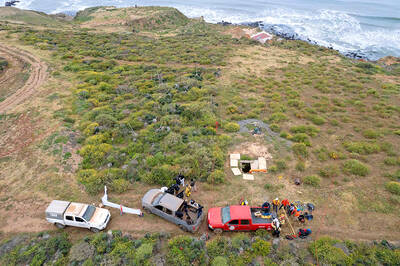Japan’s economy and industry ministry has proposed gradually releasing or allowing to evaporate massive amounts of treated, but still radioactive water at the tsunami-wrecked Fukushima nuclear plant.
The proposal made yesterday to a body of experts is the first time the ministry has narrowed down the options available to just releasing the water. It is meant to tackle a huge headache for the plant’s operator as storage space runs out, despite fears of a backlash from the public.
Nearly nine years after the 2011 triple meltdowns at Fukushima Dai-ichi, the radioactive water is still accumulating, as it is needed to keep the cores cooled and minimize leaks from the damaged reactors.

Photo: AP
For years, a government panel has been discussing ways to handle the crisis and to reassure fishermen and residents who fear potential health impacts from releasing the radioactive water as well as harm to the region’s image.
In yesterday’s draft proposal, the ministry suggests a controlled release of the water into the Pacific, allowing the water to evaporate, or a combination of the two methods.
The ministry said a controlled release into the sea was the best option because it would “stably dilute and disperse” the water from the plant using a method endorsed by the UN’s Scientific Committee on the Effects of Atomic Radiation. It would also facilitate monitoring of radiation levels in the environment.
Releasing the entire amount of water over one year would only increase radiation levels to thousands of times less than the impact humans usually get from the natural environment.
In the proposal, the ministry noted that evaporation has been a tested and proven method following the 1979 core meltdown at Three Mile Island in the US, where it took two years to get rid of 87,000 tonnes of tritium water.
The government and the plant operator, Tokyo Electric Power Co (TEPCO), have been unable to get rid of the more than 1 million tonnes of radioactive water that has been treated and stored due to opposition from local fishermen and residents fearing further damage to Fukushima’s reputation and recovery.
The utility has managed to cut down the volume of water by pumping up groundwater from upstream and installing a costly underground “ice wall” around the reactor buildings to keep the water from running into the area.
TEPCO says it has space to store only up to 1.37 million tonnes and only until the summer of 2022, raising speculation that the water might be released after the Tokyo Olympics next summer. TEPCO and experts say the tanks get in the way of decommissioning work and that they need to free up the space to build storage for debris removed and other radioactive materials. The tanks could also spill out their contents in a major earthquake, tsunami or flood.
Experts, including those at the International Atomic Energy Agency who have inspected the Fukushima plant, say the controlled release of the water into the ocean is the only realistic option, though it would take decades.
A government panel earlier compiled a report that listed five options, including releasing the water into the sea and evaporation. The three others included underground burial and an injection into offshore deep geological layers.
The panel has also discussed possibly storing the radioactive water in large industrial tanks outside the plant, but the ministry proposal ruled that out, citing risks of leakage in case of corrosion, tsunamis or other disasters and accidents, as well as the technical challenge of transporting the water elsewhere.

With the midday sun blazing, an experimental orange and white F-16 fighter jet launched with a familiar roar that is a hallmark of US airpower, but the aerial combat that followed was unlike any other: This F-16 was controlled by artificial intelligence (AI), not a human pilot, and riding in the front seat was US Secretary of the Air Force Frank Kendall. AI marks one of the biggest advances in military aviation since the introduction of stealth in the early 1990s, and the US Air Force has aggressively leaned in. Even though the technology is not fully developed, the service is planning

INTERNATIONAL PROBE: Australian and US authorities were helping coordinate the investigation of the case, which follows the 2015 murder of Australian surfers in Mexico Three bodies were found in Mexico’s Baja California state, the FBI said on Friday, days after two Australians and an American went missing during a surfing trip in an area hit by cartel violence. Authorities used a pulley system to hoist what appeared to be lifeless bodies covered in mud from a shaft on a cliff high above the Pacific. “We confirm there were three individuals found deceased in Santo Tomas, Baja California,” a statement from the FBI’s office in San Diego, California, said without providing the identities of the victims. Australian brothers Jake and Callum Robinson and their American friend Jack Carter

CUSTOMS DUTIES: France’s cognac industry was closely watching the talks, fearing that an anti-dumping investigation opened by China is retaliation for trade tensions French President Emmanuel Macron yesterday hosted Chinese President Xi Jinping (習近平) at one of his beloved childhood haunts in the Pyrenees, seeking to press a message to Beijing not to support Russia’s war against Ukraine and to accept fairer trade. The first day of Xi’s state visit to France, his first to Europe since 2019, saw respectful, but sometimes robust exchanges between the two men during a succession of talks on Monday. Macron, joined initially by EU Commission President Ursula von der Leyen, urged Xi not to allow the export of any technology that could be used by Russia in its invasion

UNDER INVESTIGATION: Members of the local Muslim community had raised concerns with the police about the boy, who officials said might have been radicalized online A 16-year-old boy armed with a knife was shot dead by police after he stabbed a man in the Australian west coast city of Perth, officials said yesterday. The incident occurred in the parking lot of a hardware store in suburban Willetton on Saturday night. The teen attacked the man and then rushed at police officers before he was shot, Western Australian Premier Roger Cook told reporters. “There are indications he had been radicalized online,” Cook told a news conference, adding that it appeared he acted alone. A man in his 30s was found at the scene with a stab wound to his back.